TUM Think Tank
Where today's societal challenges meet tomorrow's technological excellence.
How do you build a startup that drives public value? The “Impact Innovation Workshop” on December 11th, will answer this question. It is designed to empower aspiring entrepreneurs and students to explore innovation that offers value to society.
Hosted by TechForGood, the Conference of European Rabbis and the TUM Think Tank, this workshop is designed to equip you with practical tools, proven strategies, and fresh perspectives to drive innovation and meaningful change. Drawing on years of experience with startups and investors, we’ll share valuable lessons from both failures and successes. Whether you're an entrepreneur, student, or changemaker, this is your chance to connect with like-minded individuals and turn your ideas into action.
In this hands-on workshop, you’ll explore what sets impact startups apart from traditional ones, uncover opportunities to combine meaningful impact with revenue generation, and learn from seasoned experts in the field. Nir Shimony, Founder & CEO of TechForGood will give an introduction to the global impact innovation market and share lessons on how to avoid common pitfalls, the TUM Think Tank’s managing director Markus B. Siewert will give a Keynote Lecture and share his experience on supporting impact innovation. You will also have the chance to engage in an informal conversation with the impact entrepreneur Ori Goren, CEO of Nuance Audio, who turned an idea into a multimillion-dollar success, sharing insights into pivots, challenges, and personal growth along the way.
This workshop is free of charge.
To address the escalating challenge of toxic speech online, representatives from academia, civil society, government, and industry will come together for a 2-day workshop at the TUM Think Tank, in collaboration with the Bavarian Authority for New Media (BLM), the Bavarian State Ministry of Justice (StMJ), das NETTZ, the Institute for Strategic Dialogue Germany (ISD), the Bavarian Research Institute for Digital Transformation (bidt), and the Content Moderation Lab at the TUM Think Tank.
Strengthening the network
The aim is to strengthen a collaborative network focused on developing strategies to counter the rise of harmful online content. Now in its third edition, the Facilitating Constructive Dialogue Workshop will focus on addressing the issues of hate speech and mis- and disinformation.
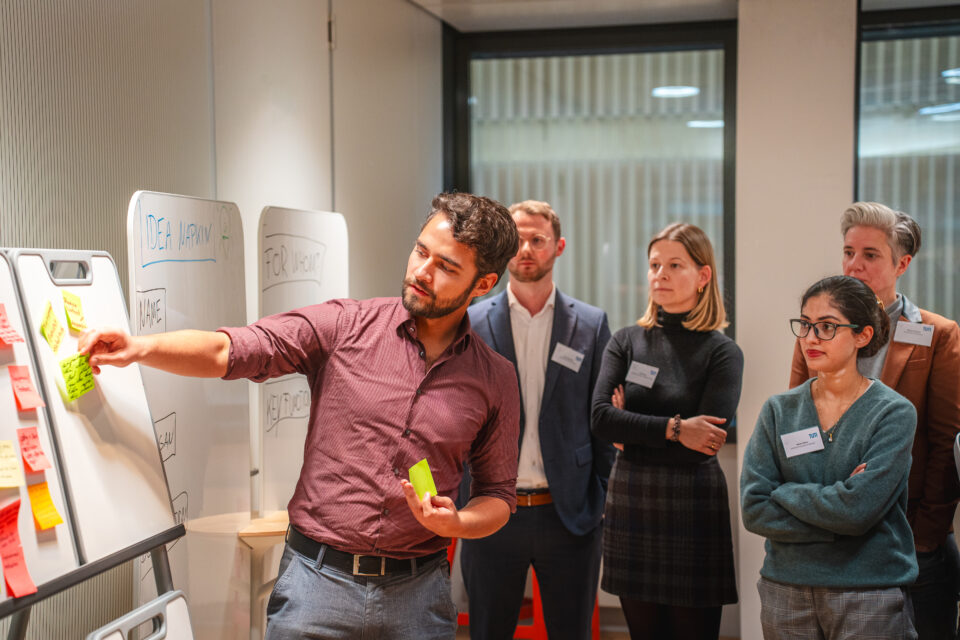
The event builds on previous workshops in 2022 and 2023 jointly organized with additional partners of our network, including Meldestelle REspect! and Lumen at the Berkman Klein Center Harvard.
As part of the GovTech Initiative, the GovTech Series at the TUM Think Tank introduces an innovative startup from the TUM GovTech ecosystem every month. Our target audience includes students, public administration staff, and other interested individuals. Each session consists of a 30-minute talk, followed by a 30-minute Q&A session, and 30 minutes of networking. The aim of the series is to foster discussions about technological innovations in the public sector. You’ll not only receive facts and figures but also gain first-hand insights into the personal stories of the founders and their experiences in building a GovTech startup.
The series is held in English.
Tuesday, Nov 26, 2024 at 5 PM – Andreas Michel, MD & CEO & Co-Founder of Locaboo
Andreas Michel – Managing Director & Co-Founder of Locaboo, a leading provider of digital space management solutions.
Thursday, December 12, 2024, at 5 PM – Sascha Soyk, CEO & Founder of GovRadar
Sascha Soyk – CEO & Founder of GovRadar, an AI-based software focused on optimizing public procurement processes.
Tuesday, January 21, 2025, at 5 PM – Flora Geske, CEO & Co-Founder of SUMM AI SUMM AI
Flora Geske – CEO & Co-Founder of SUMM AI, a platform supporting communication in the public sector.
Tuesday, February 4, 2025, at 5 PM – Benjamin Degenhart, Co-Founder of Förderfunke
Benjamin Degenhart – Co-Founder of Förderfunke, a platform dedicated to deciphering the complex landscape of German funding opportunities.
Wednesday, March 12, 2025, at 5 PM – Anna Spitznagel, CEO & Co-Founder of Trail
Anna Spitznagel – CEO & Co-Founder of Trail, a platform designed to simplify AI governance and operationalize the EU AI Act.
This semester, the Quantum Social Lab invites you to a human-centered perspective on quantum technologies: Dive into the intersection of art and quantum, design your own project, and get a chance to present it at PUZZLE X 2024! Ready for a challenge integrating creativity, abstraction and complexity?
This course offers basic knowledge and an introduction to quantum technologies, their societal implications and art-driven quantum education. Moreover, students gain a general overview of the intersection of technology and art. Supported by our research group and artists from the QuantWorld project, the students develop individual educational projects on quantum technologies and their implications, focusing on applications in mobility, medicine and banking (security). Potentially, selected project ideas can be presented at a fair in Barcelona.
When? April 30, May 27, June 6 + project phase.
Where? Course will take place at the Hochschule für Politik München, at the TUM Think Tank.
For Whom? For Munich students of all faculties & universities.
From? Quantum Social Lab at the TUM Think Tank, together with partners from the QuantWorld project.
Application? Sign up by April 30. Sign up here via TUMonline, or for non-TUM students, email fabienne.marco@tum.de
Credits? This seminar is accredited 6 ECTS.
Ethical Data Initiative at TUM Think Tank
In the evolving landscape of data-driven technologies, where ethical concerns have risen to prominence, the multi-stakeholder workshop New Directions for Global Activities in Data Ethics addresses the need for a robust ethical framework. It explores challenges such as algorithmic decision-making and bias mitigation, while introducing the Ethical Data Initiative (EDI), a collaborative project aimed at promoting responsible data practices globally. Through discussions led by experts in data ethics, AI ethics, and international data policy, the workshop aims to shape the future direction of EDI across its pillars: international data ethics education, policy and networks and stakeholder and community engagement.
How to get involved
If you are interested in becoming part of the Ethical Data Initiative and work in a related field, we would like to invite you to the workshop day on 9 April at the TUM Think Tank.
If you can not make it in person, please feel free to join the life stream of the introduction and Sabina Leonelli's Keynote and discussion "Why Ethical Data in the Age of XAI?" and register for Webinar on Zoom from 1 PM - 2:30 PM.
Workshop Agenda
Co-Designing Generative AI Guidelines of, by, and for TUM
The TUM Think Tank's Generative AI Task Force is dedicated to establishing comprehensive guidelines for the effective integration of generative AI within TUM's educational framework. To achieve this, we are organizing a collaborative workshop involving representatives from diverse TUM sectors, including professors, postdocs, PhDs, students, administrative staff, and others. This inclusive approach ensures that the perspectives, desires, and apprehensions of all stakeholders are thoroughly considered.
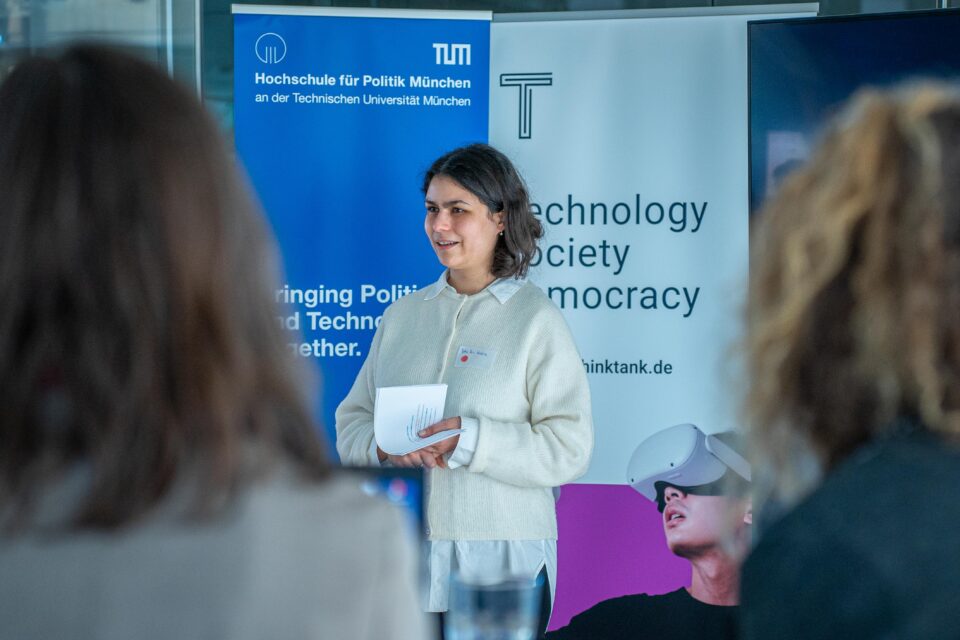
Our aim is to incorporate a wide spectrum of viewpoints encompassing legal, administrative, pedagogical, and engineering aspects. Additionally, we intend to integrate relevant pre-existing documents and initiatives within TUM pertaining to this subject matter. Through this collective effort, we aim to devise guidelines that are both robust and reflective of the multifaceted considerations inherent in integrating generative AI into teaching practices at TUM.
Impressions from the event
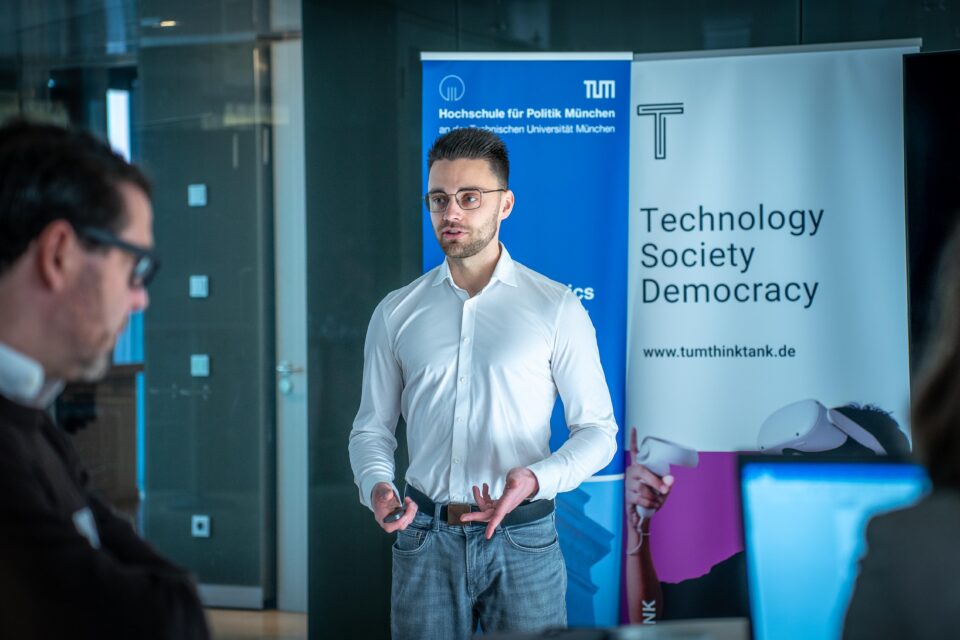 Our Generative AI Task Force member Stephan Krusche and his team brought together a diverse array of stakeholders, from professors to students and administrative staff, for a collaborative workshop aimed at establishing comprehensive guidelines for integrating Generative AI within TUM's educational framework.
Our Generative AI Task Force member Stephan Krusche and his team brought together a diverse array of stakeholders, from professors to students and administrative staff, for a collaborative workshop aimed at establishing comprehensive guidelines for integrating Generative AI within TUM's educational framework.
Here's a brief recap of our fruitful discussions:
- Expert presentations by Patrick Bassner and Pascal Bronner delved into the technical and legal aspects of generative AI, laying a solid foundation for our discussions.
- Engaging group brainstorming sessions captured on our collaborative boards fueled in-depth discussions on topics ranging from curriculum design to ethical AI use, assessment, and beyond, with valuable insights shared by all participants.
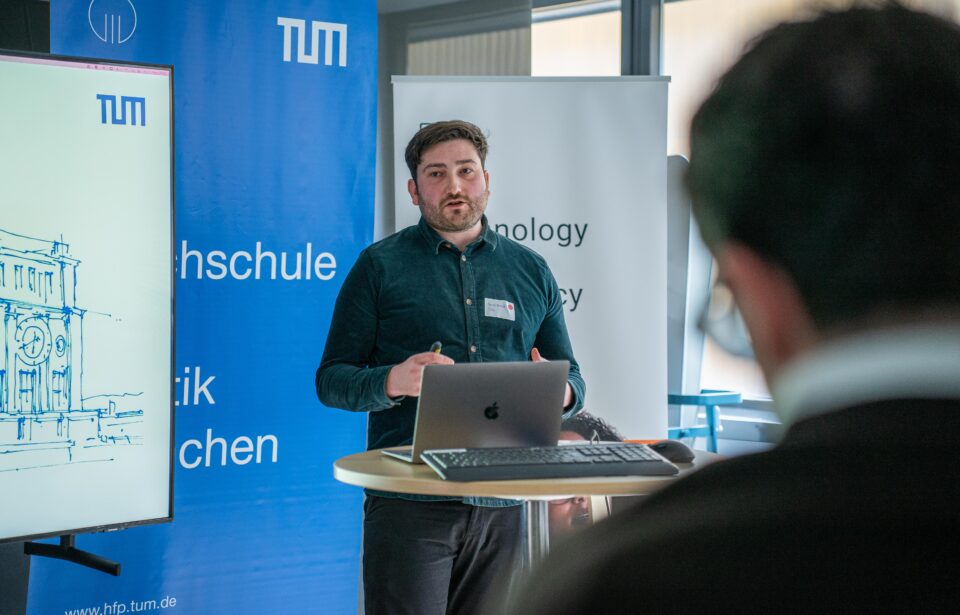
Key takeaways include the importance of transparency, accountability, and continuous evaluation in developing guidelines that reflect the dynamic nature of AI integration in education.
As we move forward, we'll be synthesizing today's inputs into actionable steps, with a focus on transparency and adaptability.
A big thank you to all participants for their active engagement and valuable contributions and a special thanks to Stephan Krusche and team for organizing the event, especially to Maximilian Sölch, to Patrick Bassner and Pascal Bronner for their insightful expert talks and to Noha Lea Halim for the co-organization and stellar moderation!
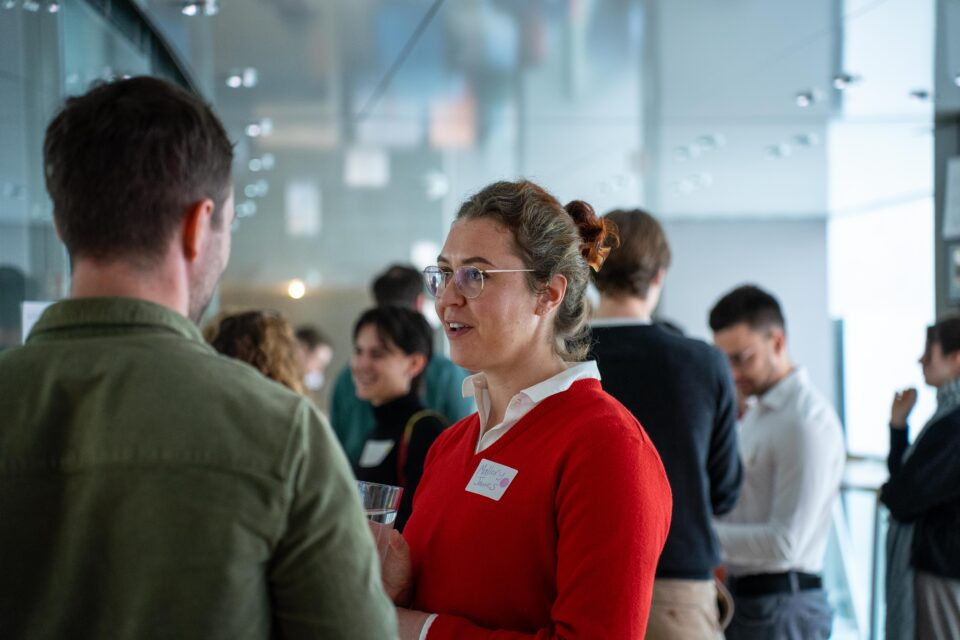
Call for action
If you’re interested in actively participating and shaping TUM's Generative AI guidelines, contact us: tumthinktank@hfp.tum.de. All professors, postdocs, PhDs, students, administrative staff, and others from the TUM environment are welcomed!
The AI Roadshow is a service for the ministries of the Bavarian State Government. We look forward to exploring the topic of generative AI in public administration together.
If you are interested in exploring further options for collaborations in the public sector, please contact us at tumthinktank@hfp.tum.de.
In an increasingly digitally interconnected world, the rise of hate speech poses a particular threat to tolerance, diversity, and respect. To address the escalating issue of online hate speech, representatives from science, business, the public sector, media, and civil society gathered last week at the TUM Think Tank and the Bavarian State Center for New Media (BLM) in collaboration with the Bavarian State Ministry of Justice, the Society for Civil Rights, Lumen at Harvard University, and the reporting center REspect! for a two-day workshop. The goal was to build and strengthen a network that collaboratively explores strategies against the escalation of online hate speech and harmful content on the internet.
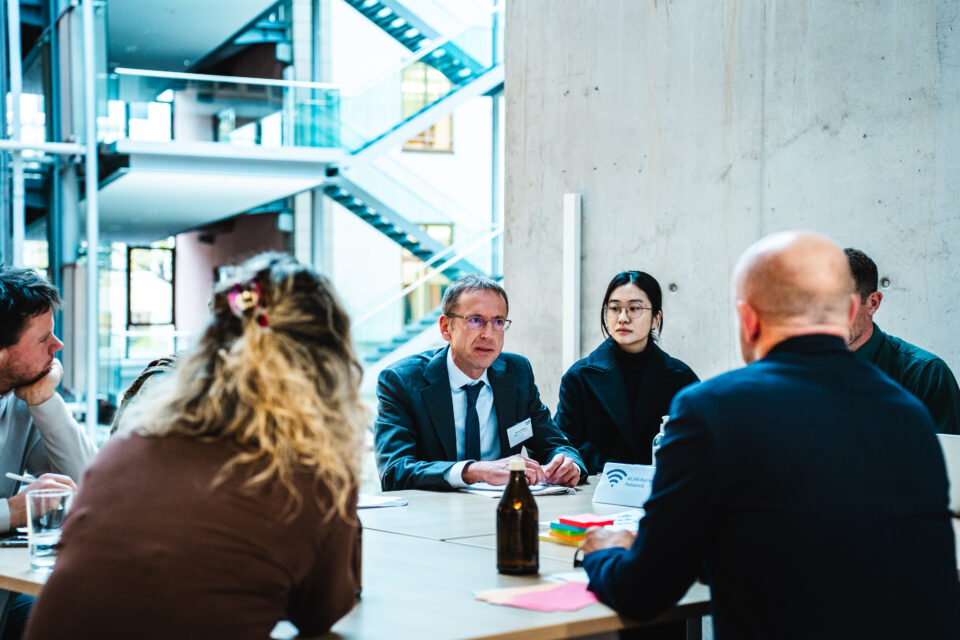
The program covered legal aspects of the Digital Services Act (DSA) and how they will be implemented in the future, the redesign of content moderation through participatory risk management, and the potential benefits of public-private partnerships in the prosecution of hate speech. Furthermore, the workshop provided insights into the perspectives of the Public Prosecutor's Office, police, and media regulatory authorities on the issue of hate online and explored strategies, tactics, and tools that democratic societies can employ to combat online hate speech. Special emphasis was placed on discussing sectoral boundaries and active participant exchange.
Participants emphasized the importance of actively involving users in the legislative process. Lena-Maria Böswald from Das NETTZ underscored that there is still much room for improvement in legislation and that civil society organizations should also have an influence on shaping these laws. "To achieve a healthier online discourse, it is crucial to work together on the root causes of online hate by collaborating not only with civil society organizations but also with legislators and scientists. Progress can only be achieved through such combined efforts."

The main insights and takeaways from the two days:
- Promoting active collaboration among different sectors is vital for exploring effective strategies and tools within democratic societies to combat hate speech online.
- In implementing the DSA, we face various challenges like transparency, inclusion, legal complexities, workload, and disparities in engagement between organizations and regular users. Clearly defining responsibilities among platform operators, regulatory bodies, civil society, and justice is a work in progress.
- Active user involvement in legislative processes emerged as a pivotal focus. Collaborating among civil society, lawmakers, and researchers is essential for meaningful progress. By exploring economic incentives in reporting, engaging citizens and academia via online forums, and educating the public on reporting methods, we can bridge the gap between users and other stakeholders.
- There is an urgency in simplifying and popularizing reporting processes, as well as making roles clearer in the process of combating hate speech. Addressing inclusivity and accessibility issues for diverse victim groups, utilizing social media and influencers to boost reporting, and recognizing the pivotal role of bystanders in amplifying reporting initiatives are key topics to promote the reporting of online hate speech.
Dr. Thorsten Schmiege, President of the BLM, outlined the diverse and longstanding commitment of the BLM to extremism prevention and against anti-Semitic hate. The BLM addresses issues such as incitement to hatred or Holocaust denial, has launched the initiative "Justice and Media – Consistently Against Hate" in collaboration with the Ministry of Justice, is a member of the Bavarian Alliance for Tolerance, and strengthens user resilience through numerous media literacy initiatives such as the Media License Bavaria. Schmiege called for even more networking: "Let us together send a signal for freedom of expression and against hate, anti-Semitism, and incitement to hatred online! Only the power of many can counter the power of many."
Did you know?
Disenchantment with politics and the rise of disinformation are pressing challenges in today's democracies. In peri-urban and rural areas, where 40% of surveyed citizens feel left behind by society and politicians, the impact is even more pronounced. Ideas for Europe (I4E) and Alliance for Europe (A4E) are committed to addressing this issue head-on, and you can be part of the solution.
About the workshop
The online workshop, 'Who is lying now? Identify and Fight Disinformation!' is a unique opportunity to gain insights and practical tools for combating disinformation. It's designed for international media literacy experts, lifelong learning professionals, and journalists as a train-the-trainers initiative.
What you will learn
- Understand the cognitive process behind disinformation's influence on human behavior.
- Discover effective strategies to disrupt and counter disinformation.
- Learn how to categorize and map out disinformation content.
- Acquire the skills to communicate your actions in countering disinformation.
Register now and join us in our mission to tackle disinformation and empower communities.
This workshop is part of the EU-funded CERV project 'Ideas for Europe' (I4E) and funded by the European Commission.
COVID-19, home office, Deutschlandtakt and Deutschlandticket: A lot has changed in public transport in recent months and years. At this event, speakers from the Technical University of Munich (TUM), Deutsche Bahn, MOIA, fairtiq, Wiener Linien and Agora Verkehrswende will take a look at the future of public transport.
- How can the potential of the Deutschlandticket be exploited, for example by further developing the service, integrating new forms of mobility and digitizing ticketing?
- What mobility guarantees are necessary for a successful transportation turnaround?
- What can we learn from the often cited 365-euro ticket in Vienna?
- How will changes in public transport affect different population groups (positively and negatively)?
Scientists from the Technical University of Munich will report on the role of research in the monitoring and evaluation of these changes and the challenges they pose. Other experts will present and discuss their ideas for the future of public transport. Our guests include:
- Lennart Adenaw, Fabienne Cantner, Allister Loder (TU München)
- Mario Theis (DB Regio)
- Paula Ruoff (fairtiq)
- Philipp Kosok (Agora Verkehrswende)
- Nikolas Feichtinger (Wiener Linien)
- Felix Zwick (MOIA)
After the event, on-site participants will have the opportunity to learn more about the new approaches in mobility research in an exchange with experts from science and practice and to discuss the role of research.
The event is organized by Agora Verkehrswende and the TUM Think Tank in close cooperation with MCube, the Munich Cluster for the Future of Mobility in Metropolitan Regions.
Registration
For participation in presence on site in Munich please register here:
On Site
Click here to register to participate online in the livestream:
Online
Questions
Participants on-site and online can contribute with questions during the event via Slido.
Recording & Presentation
We will record the event and publish the recording as well as the presentations afterwards on this page.
